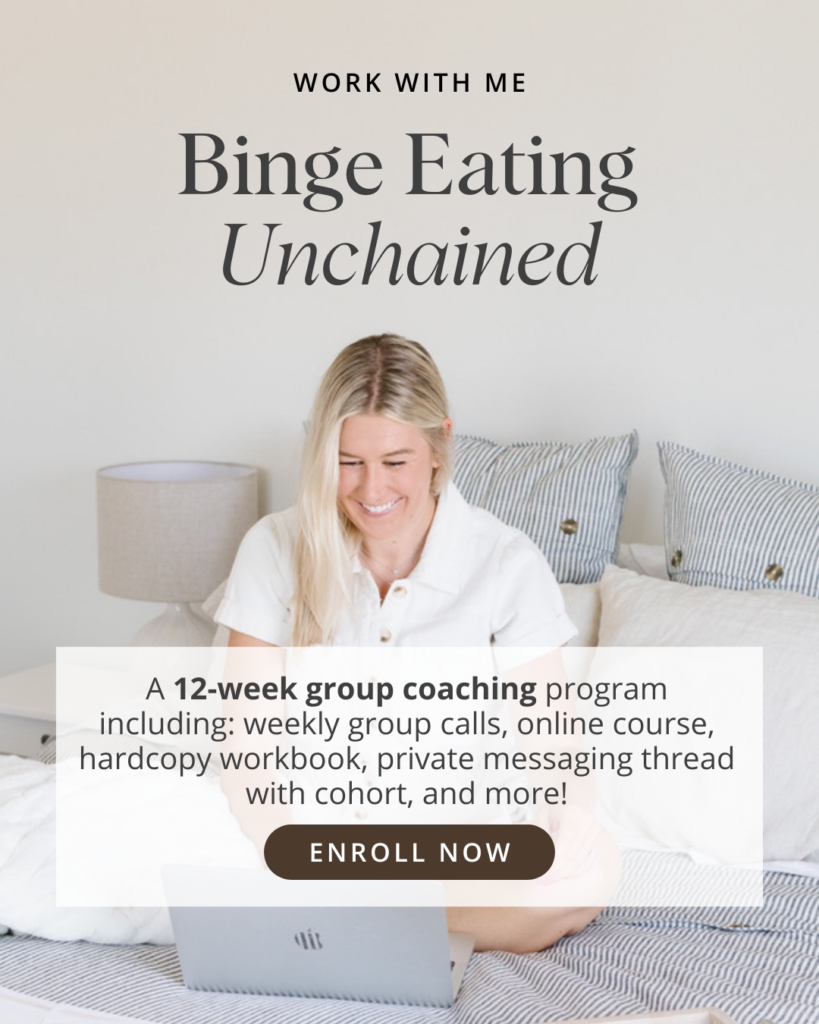Struggling with binge eating can often lead to a negative and hopeless headspace, making the journey toward recovery seem daunting. If you’ve been trying to recover but still find yourself struggling and starting to feel hopeless, here’s what you need to do to regain hope and motivation for recovery:
01) Acknowledge and Accept Your Feelings
The first step towards positive change is acknowledging and accepting the negative emotions you’re experiencing. Understand that it’s okay to feel overwhelmed, and your emotions are valid.
Ideas For How To Do This
- Journaling: Use journaling as a tool to express your emotions. Write down your thoughts and feelings without judgment. This process can help you gain clarity on the source of your negative headspace.
- Self-Compassion Practices: Practice self-compassion by acknowledging that struggling with binge eating is a challenging journey. Treat yourself with kindness and understanding, recognizing that setbacks are a part of the recovery process.
02) Identify Triggers and Patterns
Understanding the triggers and patterns that contribute to binge eating episodes is crucial. Identifying these factors empowers you to take proactive steps toward breaking the cycle.
Ideas For How To Do This
- Self-Reflection: Reflect on the situations, emotions, or thought patterns that typically precede a binge episode. Identifying these triggers provides insights into potential areas for intervention and coping strategies.
- Mindfulness Practices: Engage in mindfulness practices to observe your thoughts and emotions without judgment. Mindfulness can help you become more aware of the factors contributing to negative headspace and empower you to respond with intention.
03) Set Small, Achievable Goals
Breaking the cycle of binge eating can be overwhelming, but setting small and achievable goals creates a sense of accomplishment, boosting motivation.
Ideas For How To Do This
- SMART Goals: Establish SMART goals (Specific, Measurable, Achievable, Relevant, Time-bound) related to your recovery journey. For example, a goal could be incorporating one mindful eating practice each day.
- Celebrate Progress: Celebrate small victories along the way. Acknowledge and appreciate the positive steps you take, reinforcing the notion that change is possible.

04) Create a Supportive Environment
Surrounding yourself with a supportive environment can significantly impact your motivation for recovery. Seek encouragement from those who understand your journey.
Ideas For How To Do This
- Connect with Supportive Individuals: Reach out to friends, family, or support groups who are empathetic and understanding. Sharing your struggles and successes with a supportive community can provide encouragement and motivation.
- Professional Support: Consider seeking professional guidance from therapists or counselors specializing in eating disorders. Professionals can offer personalized strategies and tools to navigate the challenges you’re facing.
05) Establish a Routine
Creating a structured routine can provide stability and reduce feelings of chaos, contributing to a more positive headspace.
Ideas For How To Do This
- Meal Planning: Plan and prepare balanced meals ahead of time. Having structured meal times and nutritious options readily available can minimize the likelihood of impulsive eating and contribute to a more stable routine.
- Incorporate Self-Care: Integrate self-care practices into your daily routine. Whether it’s meditation, exercise, or leisure activities, prioritizing self-care contributes to a positive mindset.
06) Visualize Your Recovery Journey
Visualization can be a powerful tool for inspiring motivation. Envisioning your journey toward recovery and the positive changes you aim to achieve can create a sense of hope.
Ideas For How To Do This
- Create a Vision Board: Develop a vision board that represents your recovery goals. Include images, quotes, and affirmations that resonate with the positive changes you aspire to make. Display this board in a visible place for daily inspiration.
- Guided Imagery Meditation: Practice guided imagery meditation where you mentally visualize a positive and successful recovery journey. Engaging your senses in this mental rehearsal can enhance motivation and reduce feelings of hopelessness.
Breaking free from a negative and hopeless headspace when struggling with binge eating is a gradual process. By acknowledging your feelings, identifying triggers, setting achievable goals, creating a supportive environment, establishing a routine, and visualizing your recovery journey, you can reignite motivation and cultivate hope. Remember that every positive step, no matter how small, contributes to the transformative process of recovery.
Must Read Books To Improve Your Relationship With Food
Just so you know, I do review everything I recommend. When you buy through links on this page, we may earn a commission.
Intuitive Eating by Elise Resch and Evelyn Tribole
When it was first published, Intuitive Eating was revolutionary in its anti-dieting approach. The authors, both prominent health professionals in the field of nutrition and eating disorders, urge readers to embrace the goal of developing body positivity and reconnecting with one’s internal wisdom about eating―to unlearn everything they were taught about calorie-counting and other aspects of diet culture and to learn about the harm of weight stigma.
Health At Every Size by Lindo Bacon
Fat isn’t the problem. Dieting is the problem. A society that rejects anyone whose body shape or size doesn’t match an impossible ideal is the problem. A medical establishment that equates “thin” with “healthy” is the problem. The solution? Health at Every Size. Tune in to your body’s expert guidance. Find the joy in movement. Eat what you want, when you want, choosing pleasurable foods that help you to feel good. You too can feel great in your body right now—and Health at Every Size will show you how.
Anti-Diet by Christy Harrison
In Anti-Diet, Christy Harrison takes on diet culture and the multi-billion-dollar industries that profit from it, exposing all the ways it robs people of their time, money, health, and happiness. It will turn what you think you know about health and wellness upside down, as Harrison explores the history of diet culture, how it’s infiltrated the health and wellness world, how to recognize it in all its sneaky forms, and how letting go of efforts to lose weight or eat “perfectly” actually helps to improve people’s health—no matter their size. Drawing on scientific research, personal experience, and stories from patients and colleagues, Anti-Diet provides a radical alternative to diet culture, and helps readers reclaim their bodies, minds, and lives so they can focus on the things that truly matter.
Just Eat It by Laura Thomas
With a perfect blend of scientific expertise and relatable anecdotes, the author dismantles societal myths around food and body image. Through practical advice, self-reflection exercises, and a touch of humor, Thomas equips readers with the tools to break free from the cycle of diet culture, promoting self-love and nourishment. This book is an essential companion for anyone seeking to redefine their approach to food, fostering a positive and sustainable lifestyle.
Ryann Nicole
Licensed Therapist, Certified Nutritionist, and Virtual Wellness Coach
Ryann is a licensed therapist and virtual wellness coach who has assisted individuals worldwide in establishing a healthier relationship with food and their bodies.
Are You Ready to Heal Your Relationship With Food?
I understand—it can be overwhelming to figure out where to begin. Let's simplify things and have you start right here:
Why Am I Overeating?
First Steps To Stop Binge Eating
The Food Freedom Lab Podcast
FREE QUIZ
FREE GUIDE
Podcast
the food freedom lab podcast



